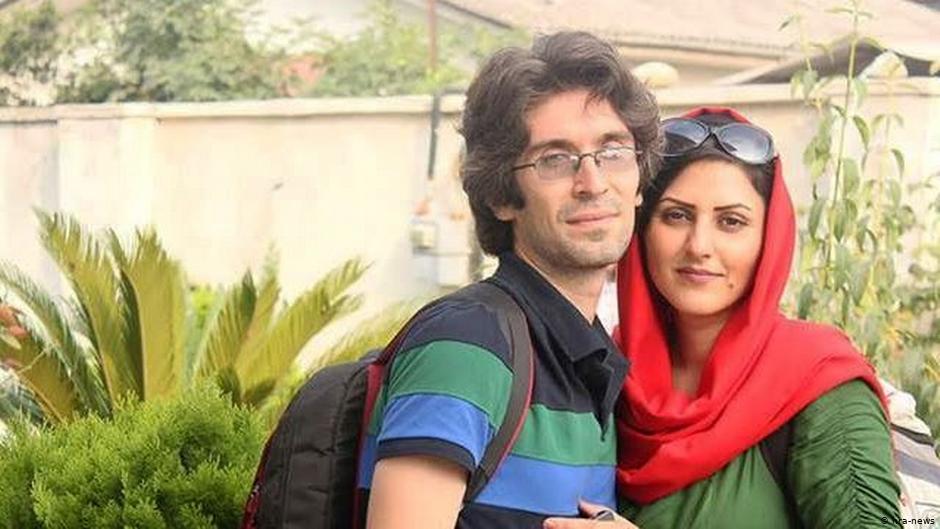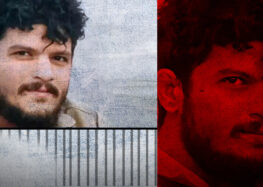Letter from Iran: “Political Prisoners Have Nowhere to Turn for Safety and Support”

- The married couple Arash Sadeghi and Golrokh Iraee Ebrahimi are imprisoned in Iran for engaging in peaceful civil rights activism.
In a letter from Rajaee Shahr Prison in the Iranian city of Karaj, political prisoner Arash Sadeghi rang alarm bells over the deteriorating situation of his wife, fellow political prisoners who are at risk of contracting COVID-19, as well as those who’ve been transferred to prisons that are far from their families and friends.
“The prisoners are increasingly in danger of attracting the coronavirus because new prisoners who enter the facility are not quarantined,” wrote Sadeghi, who has been imprisoned since 2016 for engaging in peaceful activism.
In April 2020, the Center for Human Rights in Iran (CHRI) urged Iranian authorities to follow WHO guidelines on protecting prisoners from COVID-19.
People in prisons and other places of detention are more vulnerable to diseases and viruses due to their confined living conditions.
In Iran, this risk is heightened due to severe, documented overpopulation, insufficient cleaning and hygiene supplies, as well as the absence or denial of adequate medical treatment.
Sadeghi also detailed the inhuman treatment of his wife Golrokh Iraee Ebrahimi, who has been in and out of prison in Iran since 2016 after being arrested for having an unpublished story about stoning in her home.
“When the Iraee family met with the prison director last week and asked why Golrokh had been put in a ward with drug offenders, he said the order had been given by Amin Vaziri, a judge who oversees political prisoners,” wrote Sadeghi.
Sadeghi’s letter, dated February 3, 2021, addresses the UN High Commissioner for Human Rights Michelle Bachelet.
Political prisoners in Iran including elderly inmates are singled out for harsh treatment, which often includes denial of medical care. The threat of withheld medical care has also been used as an intimidation tool against prisoners who have challenged the authorities or filed complaints.
The UN has expressed serious concerns over Iran’s continuous denial of appropriate healthcare to detainees, despite repeated calls.
The UN’s Standard Minimum Rules for the Treatment of Prisoners state, “…Where hospital facilities are provided in an institution, their equipment, furnishings and pharmaceutical supplies shall be proper for the medical care and treatment of sick prisoners, and there shall be a staff of suitable trained officers.”
Iran’s State Prison Regulations are also explicit regarding the medical care of prisoners. Article 118 states, “Examination, and when necessary treatment, of sick convicts is the responsibility of the prison or training facility.”
Yet the grossly inadequate nature of the “treatment” provided in Iranian prisons is apparent through prisoners’ testimonies and documented cases of denial of medical care.
Sadeghi wrote in his letter that in December 2020, his wife had been violently transferred from Gharchak Prison in Varamin, south of Tehran, to Ward-2A of Evin Prison, which is controlled by the Islamic Revolutionary Guard Corps (IRGC).
After being interrogated for 43 days, Iraee was returned to Gharchak Prison on January 24, 2021, and on the same day–without being allowed to collect her clothes and other belongings–was sent to the Central Prison in Amol, northern Iran.
Ebrahimi is being held in a dangerous and unsanitary ward with about 50 inmates convicted of drug-related offenses, in violation of Iranian laws requiring the separation of inmates based on their type of conviction.
Article 69 of Iran’s State Prisons Organization’s regulations state: “All convicts, upon being admitted to walled prisons or rehabilitation centers, will be separated based on the type and duration of their sentence, prior record, character, morals and behavior, in accordance with decisions made by the Prisoners Classification Council.”
Sadeghi also wrote that since Ebrahim Raisi had been appointed judiciary chief in March 2019 by the supreme leader, “acts of oppression and torture, while undergoing a superficial transformation, have increased.”
Following are excerpts of Sadeghi’s letter translated by CHRI:
The death of [political prisoner] Alireza Shirmohammadali [in June 2019], the intimidation and torture of political prisoners, such as exiling the male prisoners to the Greater Tehran Central Penitentiary (GTCP) or Rajaee Shahr Prison, and the women to Gharchak Prison in Varamin, beatings carried out by prison authorities, filing new false charges against political prisoners for criticizing the regime, intimidating prisoners’ families and exiling them to cities far away from their place of residence, refusing to separate them from dangerous prisoners, and denying them the most basic rights, such as treatment at hospitals, are only a small portion of the human rights abuses committed under Ebrahim Raisi.
Unfortunately, prisoners have nowhere to turn for safety and support. Their situations are much worse in prisons that are located in remote regions.
The regime resorts to the most violent methods in order to break the prisoners’ spirits, and they are getting worse on a daily basis with the cooperation of [Judge] Amin Vaziri, who is a puppet in the hands of the security establishment, namely the IRGC and the Intelligence Ministry.
Sadeghi also listed the names of political prisoners who have been unlawfully transferred to prisons that are far from their hometowns, making it extremely difficult for their families to visit them:
- Zeinab Jalalian, exiled to a prison in Yazd, Yazd Province (4th transfer in a year)
- Samaneh Norouz-Moradi, exiled to Lakan Prison in Rasht, Gilan Province
- Saba Kord-Afshari, exiled to Gharchak Prison in Varamin, Tehran Province
- Zahra Safaei, exiled to Gharchak Prison
- Changiz Ghadamkhizi, exiled to a prison in Ahvaz, Khuzestan Prison
- Reza Mohammad-Hosseini, exiled to Rajaee-Shahr Prison
- Mehdi Meskinnavaz, exiled to Rajaee-Shahr Prison
- Soheil Arabi, exiled to Rajaee-Shahr Prison
- Maryam Samghani, exiled to a prison in Gorgan, Golestan Province
- Soheila Hejab, exiled to Gharchak Prison
- Arsham Rezaee, exiled to Rajaee-Shahr Prison
- Yasaman Ariyani, exiled to Kachuei Prison in Karaj, Alborz Province
- Monireh Arabshahi, exiled to Kachuei Prison
- Nasrin Sotoudeh, exiled to Gharchak Prison






